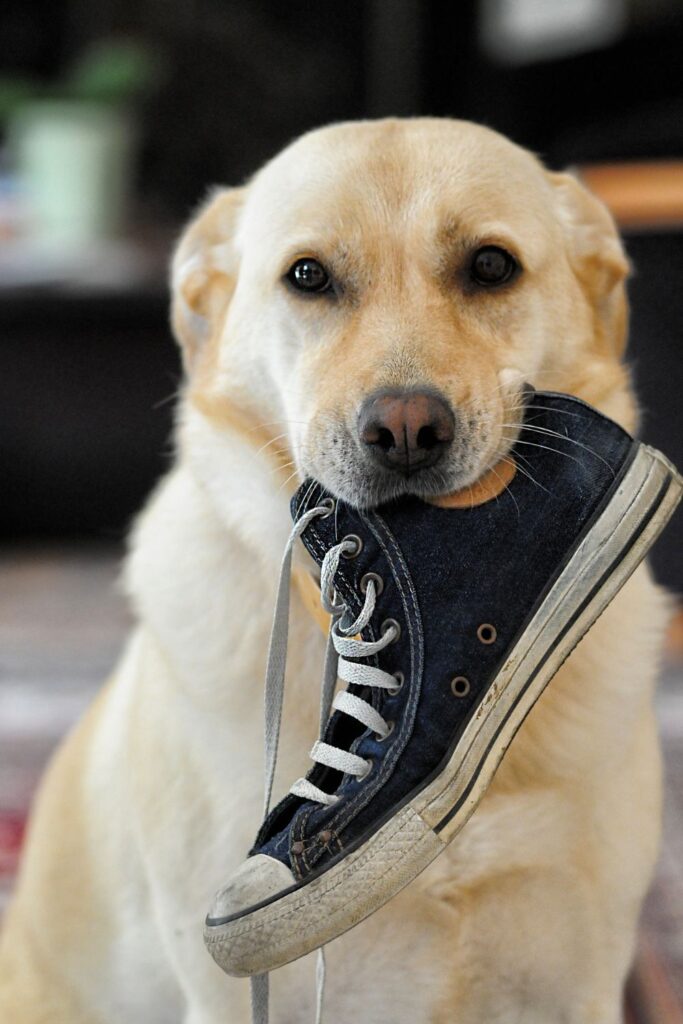We’ve all been there – you come home after a long day, only to find your once well-behaved dog has turned into a little furry wrecking ball. Shoes chewed, pillows torn, and a guilty-looking pup waiting to greet you. It’s a frustrating and puzzling situation that leaves many dog owners scratching their heads, wondering what could have triggered such sudden destructive behaviors.
In this blog post, we’ll embark on a journey to unravel the mystery behind your dog’s newfound penchant for destruction. Understanding the root causes is the first step towards addressing and resolving these behaviors, allowing you and your furry friend to live harmoniously once again. So, grab a cup of coffee, sit back, and let’s delve into the fascinating world of canine behavior.
Understanding Destructive Behaviors in Dogs
Before we dive into the potential causes of sudden destructive behaviors in dogs, it is crucial to have a comprehensive understanding of what these behaviors entail. Destructive behaviors can manifest in various forms, from chewing and scratching furniture to excessive barking and digging. Such behaviors can result in damage to your home, disruption of your daily routines, and even pose a threat to your dog’s well-being. By recognizing and defining these behaviors, we can better address them.

Defining Destructive Behaviors
Destructive behaviors in dogs are actions or activities that lead to the destruction of objects, property, or even harm to themselves. These behaviors are often categorized as an outlet for boredom, anxiety, frustration, or even a result of adverse experiences. It is essential to differentiate between destructive behaviors and normal canine behaviors, such as teething or playful chewing. Understanding the distinction allows for a more accurate assessment of the underlying causes.
When it comes to destructive behaviors, dogs can exhibit a wide range of actions. Here are a few of the most common:
- Chewing on furniture, shoes, or other household items
- Frequently digging up your garden or yard
- Barking or howling excessively
- Scratching doors, walls, or floors.
- Attempting to escape or break through barriers
It’s important to note that not all of these behaviors are destructive just for the sake of being destructive. Chewing on furniture, shoes, or other household items can be a result of teething in puppies or a sign of boredom or anxiety in adult dogs. Aggressive chewing or tearing apart toys may be a sign of frustration, a lack of appropriate chew toys, or a need for more mental and physical exercise. Attempting to escape or break through barriers can be a sign of anxiety, fear, or a desire for social interaction.
Identifying which specific behaviors your dog is exhibiting is important to pinpoint the cause accurately and guide you toward finding suitable solutions.
Potential Causes of Sudden Destructive Behaviors
When faced with sudden destructive behaviors in our canine companions, it’s crucial to investigate the underlying causes. Understanding the potential triggers can help us address the problem holistically and effectively. The causes of destructive behavior can be broadly classified into medical, behavioral, and environmental factors.

Medical Causes
One of the primary triggers for sudden destructive behaviors in dogs can be underlying medical conditions. Pain, discomfort, or hormonal imbalances can drive dogs to act out. In such cases, it is imperative to consult with a veterinarian to rule out any medical issues that may be contributing to your pet’s behavior.
For example, if a dog suddenly starts chewing on furniture, it could be a sign of dental pain or discomfort. Dogs may resort to destructive behaviors as a way to alleviate their discomfort. By conducting a thorough examination, a veterinarian can identify and treat any medical conditions that may be causing the destructive behavior.
In addition to physical ailments, certain medications can also have side effects that lead to destructive behaviors in dogs. It’s important to review any recent changes in medication with your veterinarian to determine if they could be contributing to the behavior issues.
Behavioral Causes
Behavioral factors encompass learned behaviors, anxiety, fear, or frustration exhibited by dogs. Dogs may engage in destructive behaviors as a response to separation anxiety, boredom, or inadequate mental stimulation. Understanding the behavioral triggers can help tailor interventions and training techniques to address these underlying factors.
Separation anxiety is a common behavioral cause of destructive behaviors in dogs. When dogs experience anxiety from being left alone, they may resort to destructive behaviors as a way to cope with their distress. This behavior can include excessive chewing, digging, or scratching at doors and windows. Implementing behavior modification techniques, such as desensitization and counterconditioning, can help alleviate separation anxiety and reduce destructive behaviors.
Boredom and inadequate mental stimulation can also contribute to destructive behaviors in dogs. Dogs are intelligent animals that require mental stimulation to prevent boredom. When their mental needs are not met, they may engage in destructive behaviors as a way to alleviate their frustration. Providing interactive toys, puzzle feeders, and engaging in regular training sessions can help keep dogs mentally stimulated and reduce the likelihood of destructive behaviors.
Environmental Causes
Our dog’s surroundings play a significant role in their overall well-being and behavior. A lack of physical exercise, mental stimulation, or inappropriate living conditions can contribute to destructive behaviors. By creating a safe and enriching environment for our dogs, we can mitigate the likelihood of destructive behavior occurrences.
Insufficient physical exercise can lead to pent-up energy in dogs, which may manifest as destructive behaviors. Dogs need regular exercise to release energy and maintain a healthy physical state. Implementing a consistent exercise routine that includes daily walks, playtime, and interactive activities can help prevent destructive behaviors caused by excess energy.
Inappropriate living conditions, such as a lack of appropriate chew toys or a confined living space, can also contribute to destructive behaviors. Dogs have a natural instinct to chew; if they do not have appropriate outlets for this behavior, they may resort to destructive chewing on furniture or household items. Providing a variety of chew toys and ensuring that dogs have a designated safe space can help redirect their chewing behavior and prevent destruction in the home.
Additionally, environmental stressors such as loud noises, changes in routine, or the presence of other animals can also contribute to destructive behaviors in dogs. Identifying and minimizing these stressors can help create a more peaceful and harmonious environment for our canine companions.

How to Identify the Cause of Your Dog’s Destructive Behavior
Identifying the cause of your dog’s sudden destructive behaviors is crucial in order to implement effective strategies for managing and addressing them. Here are some steps you can take to identify the underlying cause:
Observing Your Dog’s Behavior
Take the time to observe closely and document your dog’s behavior patterns. Pay attention to any triggers or specific circumstances that precede the destructive actions. This will help identify potential causes and establish patterns that can guide further investigation.
For example, you may notice that your dog becomes particularly destructive when left alone for extended periods of time. This could indicate separation anxiety or boredom as potential causes. On the other hand, if your dog tends to become destructive when encountering particular objects or situations, it may suggest fear or anxiety as the underlying cause.
By carefully observing and documenting these behaviors, you can gather valuable information that will aid in identifying the cause of your dog’s destructive behavior.
Consulting with a Veterinarian
When dealing with sudden behavioral changes, it is always wise to consult with a veterinarian. A thorough medical examination can help identify any underlying medical conditions that may be contributing to the destructive behaviors. Additionally, your veterinarian can provide guidance on suitable interventions and treatments.
During the veterinary examination, the veterinarian may conduct various tests to rule out any physical ailments that could be causing discomfort or pain in your dog. They may also inquire about your dog’s diet, exercise routine, and overall lifestyle to assess if any changes need to be made to improve their well-being.
It’s important to remember that some medical conditions, such as thyroid issues or neurological disorders, can manifest as sudden changes in behavior. Identifying and treating these conditions can significantly improve your dog’s behavior and quality of life.

Working with a Professional Dog Behaviorist
Engaging the expertise of a professional dog behaviorist can provide valuable insights into your dog’s behavior. A behaviorist can assess the underlying causes, develop a behavior modification plan, and guide you through the training process. Their expertise can greatly enhance your understanding of your dog’s behavior and help you address the issue more effectively.
When working with a behaviorist, they will likely conduct a thorough evaluation of your dog’s behavior, taking into consideration their history, environment, and any previous training or experiences. This evaluation will help the behaviorist gain a comprehensive understanding of your dog’s behavior and determine the most appropriate approach to address the destructive behaviors.
The behaviorist may recommend specific training techniques, and environmental modifications or even suggest changes in your own behavior to better communicate with your dog. They will work closely with you to develop a tailored behavior modification plan that suits your dog’s individual needs and your lifestyle.
Additionally, a behaviorist can provide ongoing support and guidance throughout the training process, helping you navigate any challenges that may arise. With their expertise and experience, you can feel confident in your ability to address your dog’s destructive behavior and improve their overall well-being.

Managing and Treating Destructive Behaviors
Once you have identified the causes of your dog’s destructive behaviors, developing a comprehensive management and treatment plan is essential. Different approaches can be employed depending on the specific factors contributing to the behaviors.
Training Techniques for Destructive Behaviors
Positive reinforcement training methods, such as redirecting your dog’s attention to appropriate toys or providing mental stimulation, can effectively address destructive behaviors that arise from boredom, anxiety, or lack of training. Consistency and patience are key when implementing these techniques.
Medical Treatments and Interventions
If medical issues are determined to be the cause of your dog’s destructive behaviors, the veterinarian may recommend specific treatments or interventions. This could involve pain management, hormonal therapy, or medications to alleviate anxiety or compulsive behaviors. Following the veterinarian’s advice is crucial for your dog’s well-being.
Creating a Safe and Stimulating Environment for Your Dog
Providing a safe and stimulating environment is vital in preventing and managing destructive behaviors. Ensuring your dog has access to appropriate toys, regular exercise, mental stimulation, and a comfortable living space can significantly reduce the likelihood of destructive behaviors. Additionally, creating a routine that includes consistent mealtimes, exercise, and play sessions fosters a sense of security and stability.
By understanding the causes behind your dog’s sudden destructive behaviors, you can take proactive steps toward their well-being and a harmonious household. Whether addressing medical issues, implementing behavior modification techniques, or creating an enriching environment, your dedication and care can make a world of difference for your four-legged companion.


